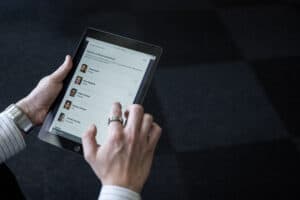Tusk Philanthropies has awarded a grant to Assembly Voting and Open Source Election Technology Institute (OSET) to develop an end-to-end verifiable mobile voting solution for digital absentee voting as part of the Mobile Voting Project, an initiative that aims to increase voter participation in U.S. elections by making voting more convenient and accessible.
Copenhagen 30 September, 2021: Assembly Voting today announced that it has received a grant from Tusk Philantropies and selected to become part of a project aimed at developing an open source, end-to-end verifiable mobile voting solution for remote digital absentee voting in U.S. elections. The grant was awarded as part of an initiative named the Mobile Voting Project and Assembly Voting will work alongside Open Source Election Technology (OSET), a nonprofit organization devoted to election technology research who has also received grant funding.
Tusk Philanthropies launched a campaign for Mobile Voting in late 2017 to bring mobile voting options to U.S. elections and increase voter turnout by making voting more convenient and accessible. Since 2018, the campaign has completed 20 mobile voting pilots in seven states – Colorado, Oregon, South Carolina, Utah, Virginia, Washington, and West Virginia. Through these pilots, Tusk Philanthropies discovered the need for a coordinated effort to develop an enabling technology for mobile voting using established federal guidelines and national security best practices.
“We founded the Mobile Voting Project because our current approach to U.S. elections leaves many voters behind – especially military, rural, and disabled voters,” said Bradley Tusk, CEO and Founder of Tusk Philanthropies. “Our first phase of the project showed that while mobile voting is clearly possible, we need more transparent, open source voting options. We chose Assembly Voting and OSET based on their decades of experience in the elections space and are proud to support their efforts to build a technology from the ground up using established federal guidelines and national security best practices.”
Tusk Philanthropies issued a call for submissions last year to better understand the capabilities of current and future mobile voting systems and assess opportunities to support the development of a full stack mobile voting technology. After a thorough review process with a diverse team of experts, MV selected Assembly Voting and the nonprofit OSET Institute to receive grant funding. Assembly Voting will develop the end-to-end verifiable voting solution and OSET will develop the accessible ballot marking application.
The mobile voting solution will be designed as a digital version of paper absentee voting and will fully comply with all existing absentee voting requirements. Unlike existing mobile voting solutions, this new technology will be based on recommendations from the U.S. Vote Foundation‘s research on end-to-end verifiable voting systems. Much of the underlying technology will be open source to allow security experts and other technologists to scrutinize the source code to verify performance assertions and identify potential threats. The system will also offer end-to-end verification so that voters can verify their votes are cast as intended and the public can verify all ballots are tallied as recorded.
“The selection of Assembly Voting to become part of MVP is a huge step forward for our company and a recognition of the maturity of our software and the work we’ve done over the last two decades to facilitate secure end-to-end verifiable election processes,” said Jacob Gyldenkærne, CEO of Assembly Voting.
”If we want to maintain a sustainable democracy, the way we participate in elections must be in sync with the contemporary way in which we lead all other aspects of our lives. Election technologies can help resolve this, but they should never compromise basic democratic principles. We need to tackle the critical issues that currently pose a risk to mobile voting. This is what the Mobile Voting Project is all about and we look forward to contributing to the solution.”
To ensure that the technology and its components meet appropriate cybersecurity standards, the grantees will adhere to recommendations from the Standards Working Group at the University of California at Berkeley’s Center for Security in Politics (CSP). The group is working to develop security, accessibility and election administration standards to successfully implement digital absentee voting in U.S. elections.
The project launched earlier this year and the grantees expect to have the system ready by early 2023. Tusk Charitable Foundation is a not-for-profit and has no commercial interest in the technology being built. No Tusk Holdings entity will profit from any voting technology or mobile voting pilot.
About Assembly Voting
Assembly Voting was the first provider of digital elections in Denmark. Since 2001 the company has conducted more than 6,000 elections with over 35 mio. voters. Today, it provides the majority of digital election solutions in Scandinavia to professional associations, municipalities, energy and pension companies and trade unions. Assembly Voting is based on the idea of strengthening democratic participation, through the integration of democratic processes and new technological opportunities. The company’s core focus is on creating systems where the entire voting process can be proved from start to finish using advanced end-to-end encryption technologies and documented processes.
About Tusk Philanthropies
Tusk Philanthropies was created by Bradley Tusk, Founder and CEO of Tusk Holdings, to dramatically increase voter turnout and participation in U.S. elections through mobile voting, beginning with UOCAVA voters and voters with disabilities. Mobile voting is a non-partisan initiative designed to not favor any one candidate or party but to expand voting options to increase participation in our electoral process. None of the Tusk entities have a financial interest in any other voting technology company they have worked with.
More info: https://mobilevoting.org/
Press contact: Frederik Ramskov, Marketing Manager, Assembly Voting: +45 31178367


